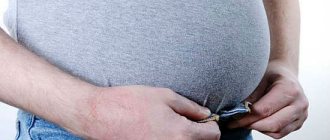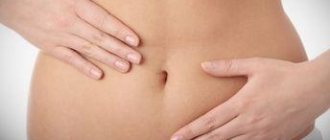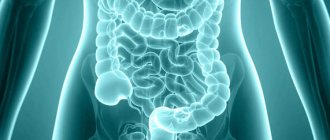Gastroenterologist
Vinogradov
Dmitry Alekseevich
4 years of experience
Gastroenterologist
Make an appointment
Bloating is almost impossible to miss. It literally expands in different directions, it becomes larger visually, rumbling sounds are heard, and there is a feeling that the abdominal area is about to rupture. Perhaps the most unpleasant symptom among the entire complex is the release of accumulated digestive gases, which requires maximum effort to contain.
Menopause
Menopause is a time in a woman's life that signals the end of her menstrual period and her ability to bear children. A woman officially enters menopause without a period after a full year.
Perimenopause and menopause symptoms, including uncomfortable bloating, can begin up to 4 years before menopause as hormone levels drop. Luckily, there are ways to relieve menopausal bloating and discomfort.
- What is bloating?
- Causes
- Water retention versus gas retention
- Prevention and relief
- Bloating or weight gain?
- When to see a doctor
- What is bloating?
Bloating is uncomfortable pressure in the abdominal area caused by extra air or fluid in the gastrointestinal tract. It may feel like fullness or tightness.
In some cases, bloating can cause a person's stomach to swell. A person may also experience temporary weight gain from bloating.
Heaviness in the lower abdomen during pregnancy
Heaviness in the lower abdomen in women during pregnancy appears due to an enlarged uterus, which puts pressure on neighboring organs (intestines, bladder, kidneys) and displaces them. Moderate pulling sensations during pregnancy without accompanying symptoms (stabbing and cramping pain, bleeding, elevated body temperature) are the norm and only require compliance with the general recommendations of the gynecologist: adhere to a healthy and balanced diet with sufficient vitamins and minerals, exclude foods that cause increased gas formation, Get moderate physical activity, for example, walking in the fresh air.
As a rule, a feeling of heaviness in the lower abdomen occurs in the early stages of pregnancy due to hormonal changes and stretching of the walls of the uterus. In late pregnancy (third trimester), abdominal and lower back pain can be caused by fetal movements and changes in the pelvic bones.
The general condition and well-being of a woman during pregnancy is monitored by an obstetrician-gynecologist. If abdominal pain intensifies or spotting appears, you should consult a gynecologist to prevent miscarriage.
Causes
Water retention and gas retention can be the cause of menopausal bloating.
Menopausal bloating usually has one of two main causes: water retention or gas retention. Both can cause bloating during menopause.
A woman's hormone levels often fluctuate during perimenopause, which is the time leading up to menopause when a woman's hormone levels decline. Elevated estrogen levels can cause water retention, which in turn can cause bloating.
Unfortunately, estrogen is not the only cause of menopause bloat. During and after menopause, bloating can also be associated with changes in the gastrointestinal tract. These changes can be caused by many things, including:
- changes in diet or appetite
- slow digestion
- stress associated with menopause
- swallowing air
- other health conditions
Any of the above can lead to bloating due to excess gas.
Water retention versus gas retention
Water retention and gas retention are the two main causes of bloating and bloating. It can be difficult to determine which of these two causes bloating.
Retention of gas , which is usually found in the stomach and is the result of trapped air. Bloating can often be prevented by eating more slowly, avoiding carbonated drinks, and eating less food.
Water retention can occur in more cases than gas retention. A woman may notice swelling in her arms and legs, across her middle or throughout her body. Water retention can cause painful bloating in affected parts of the body.
There are simple steps a woman can take to reduce the swelling and bloating associated with excess fluid retention.
Heaviness in the lower abdomen in men
Heaviness in the lower abdomen in men can be caused by several reasons: urological diseases, pathologies of the gastrointestinal tract or disorders of the musculoskeletal system. Causes of abdominal heaviness in men:
- inflammatory diseases of the genitourinary system: prostatitis, urethritis, cystitis;
- prostate adenoma (pathological growth of prostate tissue);
- testicular cyst;
- sexually transmitted infections (STDs);
- urolithiasis disease;
- inguinal hernia.
The appearance of pain indicates a pathological process in the body, so you should consult a therapist for advice. The therapist will prescribe studies (ultrasound of the pelvic and abdominal organs) and laboratory tests (urine, blood) to determine the causes of pain and identify pathologies.
Prevention and relief
Regular exercise and staying hydrated will help reduce water retention.
Preventing bloating during menopause may be the best treatment. Luckily, you can avoid bloating with a number of simple lifestyle changes, including:
- Drink more water. While water retention causes bloating, hydration keeps the gastrointestinal tract in good condition.
- Exercise regularly. Sweating during exercise helps reduce water retention and move food through the digestive system.
- Avoid trigger foods. Foods that cause gas retention include some beans, broccoli, and fatty, fried foods.
- Avoid carbonated drinks. Carbonated drinks can cause excess gas in the stomach.
- Don't use chewing gum. Chewing gum can cause a person to swallow air.
- Quit smoking. Smoking can cause a person to swallow air, which causes bloating.
- Reduce salt intake. Too much salt can cause water retention and swelling. To reduce salt content, a person should avoid processed foods.
- Take probiotics. Yogurt, sauerkraut, kefir and other probiotic foods can aid digestion.
- Eat less. Large meals can be difficult to digest, especially as metabolism slows during menopause.
If a woman finds that she suffers from frequent bloating during menopause, there are several medical treatments to relieve the discomfort. Ways to relieve bloating during menopause include:
- use of over-the-counter gas medications
- take prescription pills and diuretics
- taking hormone replacement therapy
- birth control pills
Types of adenomyosis
Depending on the distribution of pathological structures in the affected tissues, the following forms of adenomyosis are distinguished:
- Diffuse manifests itself as a uniform distribution of small inclusions of the endometrium throughout the muscular layer of the uterus;
- With the nodular type of disease, endometrioid nodes filled with blood are formed in the muscle layer;
- The focal form of adenomyosis is characterized by the formation of small accumulations of endometrial cells in various areas of the uterus.
Take the first step
make an appointment with a doctor!
There is also a cystic form, which is a further development of nodular or focal adenomyosis and is formed when the nodes hemorrhage followed by the formation of cysts. These types of this pathology can form separately or in combination with each other. The most common form is a diffuse nodular form, in which endometrial cells form a node and areas with their uniform inclusion.
There are also several stages of development of this disease, characterized by the degree of damage to the uterine tissue:
- stage 1 - at this stage, endometrial tissue penetrates only the thinnest layer of the myometrium (muscular wall) of the uterus;
- stage 2 - the pathological process penetrates deeper into the muscle wall, consisting of 3 layers, affecting 2 of them;
- stage 3 - the endometrium extends to all 3 layers of the myometrium up to the serous membrane of the uterus, which borders the surface of the bladder;
- stage 4 - endometrial tissue penetrates the uterine myometrium and affects adjacent organs, causing external gynecological endometriosis.
The signs of uterine adenomyosis and its damage to the body depend on the stage of the disease. Determining the stage of development of pathology plays an important role in its diagnosis and treatment. The earlier it is detected, the more effective and gentle the therapy will be.
Bloating or weight gain?
If bloating is painful or persistent, you should consult your doctor.
Bloating, especially from water retention, can lead to weight gain. Sometimes it can be difficult for a woman going through menopause to differentiate between weight gain and bloating.
Menopausal bloating, unlike weight gain, is also often accompanied by a distended, swollen belly and discomfort. Bloating is characterized by:
- rapid onset of weight or size during or after eating
- changes in stomach size and shape throughout the day
- short periods of bloating, either after eating or during hormone fluctuations
- discomfort or pain
On the contrary, weight gain will continue and remain. Weight gain often occurs during menopause as a result of a slower metabolism and can occur with or without bloating. Weight gain alone does not cause stomach distension during the day.
3. Symptoms, diagnosis
In addition to the rather obvious and noticeable, as they say, bloating with the naked eye, flatulence is often accompanied by a number of additional symptoms:
- spasms (colic) and pain of various types, a feeling of fullness; - involuntary emission of gases (observed not only in gastroenterological, but also in some mental disorders); - painful heartburn, incl. with the taste of recently eaten food (a sign of increased acidity and/or gastroesophageal reflux, i.e. backflow of stomach contents into the esophagus); - belching.
Diagnosis of the causes of flatulence can be quite simple (for example, asking the patient about the patient’s lifestyle, daily diet, previous and/or background diseases), but may also require a thorough examination, laboratory and instrumental, the results of which sometimes turn out to be, as shown above , very alarming.
About our clinic Chistye Prudy metro station Medintercom page!
When to see a doctor
This is typical for a woman who experiences bloating during hormonal fluctuations associated with her menstrual cycle and menopause. In most cases, bloating that clears up on its own is not a cause for concern.
However, in cases where the bloating is prolonged and painful, a woman should talk to her doctor. Painful bloating that lasts for several weeks may indicate other medical conditions that should be diagnosed by a medical professional.
Treatment
Treatment of flatulence depends on the causes that caused it. If there is a serious pathology, it is practically useless to get rid of bloating alone - it is necessary to overcome the cause that caused it.
If a detailed examination does not reveal a specific cause of periodic flatulence, you can try to trace patterns associated with nutrition and psychosomatic reactions. Nutritional adjustments and psychotherapy can provide positive results. In addition, the following measures help to cope with flatulence as a functional disorder:
- increased motor activity (improves peristalsis and activates digestion);
- herbal medicine (carminative herbal teas containing fennel, chamomile, mint);
- use of sorbents (activated carbon, etc.);
- use of enzyme preparations (as prescribed by a doctor);
- the use of special drugs aimed at ridding the intestines of gases (“defoamers”);
- pre- and probiotics;
- For women suffering from premenstrual syndrome, taking B vitamins, magnesium and potassium helps reduce bloating.










